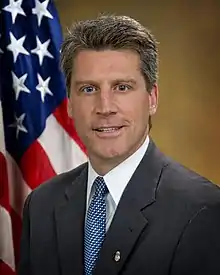Timothy Heaphy | |
|---|---|
 | |
| United States Attorney for the Western District of Virginia | |
| In office December 4, 2009 – January 1, 2015 | |
| President | Barack Obama |
| Preceded by | John L. Brownlee |
| Succeeded by | John P. Fishwick, Jr. |
| Personal details | |
| Born | 1964 (age 59–60) New Haven, Connecticut, U.S. |
| Political party | Democratic |
| Education | University of Virginia (BA, JD) |
Timothy J. Heaphy (born 1964) is a white-collar criminal defense attorney, law professor and a former United States Attorney for the Western District of Virginia. He served as the lead investigator for the House Select Committee on the January 6 Attack.[1]
Education and early career
Heaphy was raised in a Maryland suburb of Washington D.C. He attended college at the University of Virginia where he played football. He is married to Lori Shinseki, the daughter of Eric Shinseki.[2]
After graduating from the University of Virginia in 1986, Heaphy taught at a private school for a year and then joined the staff of Senator Joe Biden (D-Del.) He returned to Charlottesville, Virginia in 1988 to attend law school, graduating in 1991.[3]
Heaphy was a law clerk to Judge John A. Terry of the District of Columbia Court of Appeals before joining the law firm of Morrison & Foerster in San Francisco.[4]
Federal career
Following a two-year stint at Morrison & Foerster, Heaphy joined the U.S. Attorney's Office for the District of Columbia.[4]
In 2003, Heaphy joined the U.S. Attorney’s Office in the Western District of Virginia based in Charlottesville, Virginia. After three years, Heaphy returned to private practice, serving as a partner with the law firm of McGuireWoods.[5] In 2009, Heaphy was nominated by President Barack Obama and became the United States Attorney for the Western District of Virginia on December 11, 2009.[4][6]
Return to private practice
He left the U.S. Attorney's office in December 2014 to join Hunton & Williams.[6]
In 2016, Heaphy founded a nonprofit organization that will provide low-interest loans to formerly incarcerated persons, The Fountain Fund.
In 2017, Heaphy authored a report, commissioned by the City of Charlottesville, on the city's handling of the August 2017 Unite the Right rally.[7]
Heaphy served as an assistant Virginia attorney general and as counsel for the University of Virginia before taking a leave of absence from both positions in August 2021 after being appointed as chief investigative counsel for the United States House Select Committee on the January 6 Attack.[8]
Awards
In 2003, The National Law Journal named Heaphy one of its 40 Important Lawyers Under 40.[9]
Notes
- ↑ Glenn Thrush; Luke Broadwater (May 17, 2022). "Justice Dept. Is Said to Request Transcripts From Jan. 6 Committee". The New York Times.
- ↑ Bell, William Gardner (1981). Quarters One: The United States Army Chief of Staff's Residence (PDF). p. 31. Retrieved 21 September 2016.
- ↑ "Timothy J. Heaphy". Hunton & Williams LLP. Retrieved 21 April 2015.
- 1 2 3 "Timothy J. Heaphy, Western District of Virginia". U.S. Department of Justice. Retrieved 21 April 2015.
- ↑ Graham, Lerone (31 July 2009). "Richmond lawyer Timothy Heaphy tapped for U.S. attorney post". Roanoke Times. Retrieved 21 April 2015.
- 1 2 Vozzella, Laura (November 25, 2014). "Timothy Heaphy, U.S. Attorney in Virginia, steps down". Washington Post. Retrieved January 9, 2015.
- ↑ Wamsley, Laurel (December 1, 2017). "What Went Wrong In Charlottesville? Almost Everything, Says Report". NPR. Retrieved December 1, 2017.
- ↑ Cain, Andrew (August 12, 2021). "Heaphy to serve as chief investigative counsel for committee probing Jan. 6 attack on U.S. Capitol". Richmond Times-Dispatch. Archived from the original on August 13, 2021. Retrieved August 16, 2021.
- ↑ 40 Under 40: A Look at Some of the Most Important Young Litigators in America. The National Law Journal July 29, 2002.
References
- Movers. The National Law Journal February 6, 2006
- Jen McCaffrey, Federal Jury Spares Convicted Killer’s Life in Double-Murder Case, The Roanoke Times, February 18, 2005.
- Jim Keary. "'Slasher' is sentenced; Robber terrorized residents on Hill", The Washington Times, December 17, 1997.
External links
- Timothy J. Heaphy, United States Attorney, Office of the United States Attorneys, U.S. Department of Justice